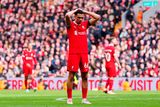Burnley fly flag for small fry as Dyche delivers
Sean Dyche will be hoping to add to his growing reputation by take the scalp of Jose Mourinho today. Photo: PA
Around Manchester United, some of the murmurs in the wake of Manchester City's commanding lead in the Premier League - and controlled win at Old Trafford - are that it is becoming "increasingly impossible to compete against a state".
The reference, of course, is to the extra depth of Abu Dhabi resources available to Pep Guardiola.
The wonder is what a number of Alex Ferguson's Premier League competitors over the years would think of that - given how United were the first to really industrialise the commercialisation of their club - let alone Burnley.
Sean Dyche's side travel to Old Trafford today for one of a small number of fixtures that so fully focus and crystallise one of the European football's dominant factors right now.
Power
Given the broadcasting money washing into the game, as well as the distinctive nature of some ownerships, it is simply impossible to get away from the imposing power of cash.
It also creates more of an discussion for managers, since the difference in resources become so distinctive and disparate that they more transparently display one of the 'fundamentals' of the job: who is best 'managing' the assets and money available to them.
There can be no debate about Dyche. He is currently doing a sensational job.
Burnley, of course, aren't the only club to threaten a sensation halfway through a campaign.
Leaving aside the outstanding outlier that was Leicester City 2015-16, there were cases like Steve Clarke's West Brom.
A lot of the talk around the Christmas of 2012-13 was whether they could really keep it up and qualify for the Champions League. They couldn't, and fell away.
Even if Burnley follow that example rather than something closer to the exception of Leicester, though, it shouldn't obscure exactly what alchemy Dyche is producing here.
Burnley have the third smallest wage bill in the Premier League going by the last accounts, so should barely be staying in the division, let alone looking somewhere between very comfortably and outright commanding.
Dyche has so honed and maximised what's available to him, mixing some proper old-school football traits like a properly coherent unit, with a modern approach to analytics.
They've also made it difficult for a lot of the really big sides this season, even those on very good form - like United.
This whole issue is a bit more complex for the Old Trafford club and Jose Mourinho, but there can be little debate he has done well in this campaign, especially when they have one of their best ever records at this point.
He has brought the side on and it could have been enough to finally bring the Premier League trophy back had it not been for City so stepping it up and standing on everybody's throats.
It is still, well, a bit rich for United to complain of resources. Sure, unlike City, they have to pay dividends, but they are still one of the most ostentatious commercial enterprises in sport, have the biggest wage bill in the division, and should be one of just two clubs, along with Chelsea, able to put it up to them.
Maximised
There's also the problem that everything is being maximised at City - not just the football team.
Even if it does give rise to a debate over whether Pep Guardiola is playing football of the future against more outdated approaches elsewhere, the Etihad club are so far ahead in terms of the football structure.
While that allows City to put proper plans in place in terms of recruitment - and plans for the short-term, medium-term and long-term - United's feels much more ad hoc.
Approaches to this January alone have already shifted a fair bit over the past month, with some of that in response to how City have been doing.
Mourinho now wants to bolster the depth of his squad, but they should still have more than enough to beat this Burnley side.
It's one of the many things that City have made a virtue of this season, but one thing that football as a sport so often upends.
Even if money has now pervaded all levels of the game to such a perverse degree, it doesn't always win.
Therein lies the great frustration for United this season, and precisely why Burnley have been such a success.
United will be taking nothing for granted today after their failure to beat 10-man Leicester last Saturday, which prompted a furious reaction from Mourinho.
The United manager accused his players of making "childish" decisions after Harry Maguire scored with virtually the last kick of the game to rescue a 2-2 draw for Leicester.
Juan Mata's double looked to have given the visitors a valuable win after Jamie Vardy's opener, his 50th Premier League goal, before Maguire struck, despite Daniel Amartey's second-half dismissal.
The visitors missed several chances, with Anthony Martial blazing the ball over with only Kasper Schmeichel to beat and Jesse Lingard hit an upright after rounding the goalkeeper.
Mourinho was also fuming after his touchline instructions to Ashley Young were not heeded when he wanted to stop an injured Chris Smalling from marking Maguire, just before the defender scored.
Maturity
Mourinho said: "I had the chance to speak with Ashley Young to tell him the way the team had to be in position because of Smalling's difficulty, but there was a lack of maturity.
"I cannot stop the game and give a team talk. For the last two minutes the players had to immediately adapt, to read the game, which they didn't, so we had childish decisions in front of goal and bad decisions as it was not just about the goals we missed, or dribbling or hitting the post.
"It was not just about missing chances with an open goal; it was also about decisions. Easy decisions to make in easy transitions to counter-attack.
"Some players have childish decisions and time helps them to have maturity and to decide better. But some other players stay with childish decisions until the end of their career.
"It's a big frustration because they are easy goals to score and to kill the game.
"On top of that, in the last couple of minutes we allow the opposition to throw a few balls to the box. Sometimes you take a point and you say 'OK' and you accept it as a positive result. That's not the case."














